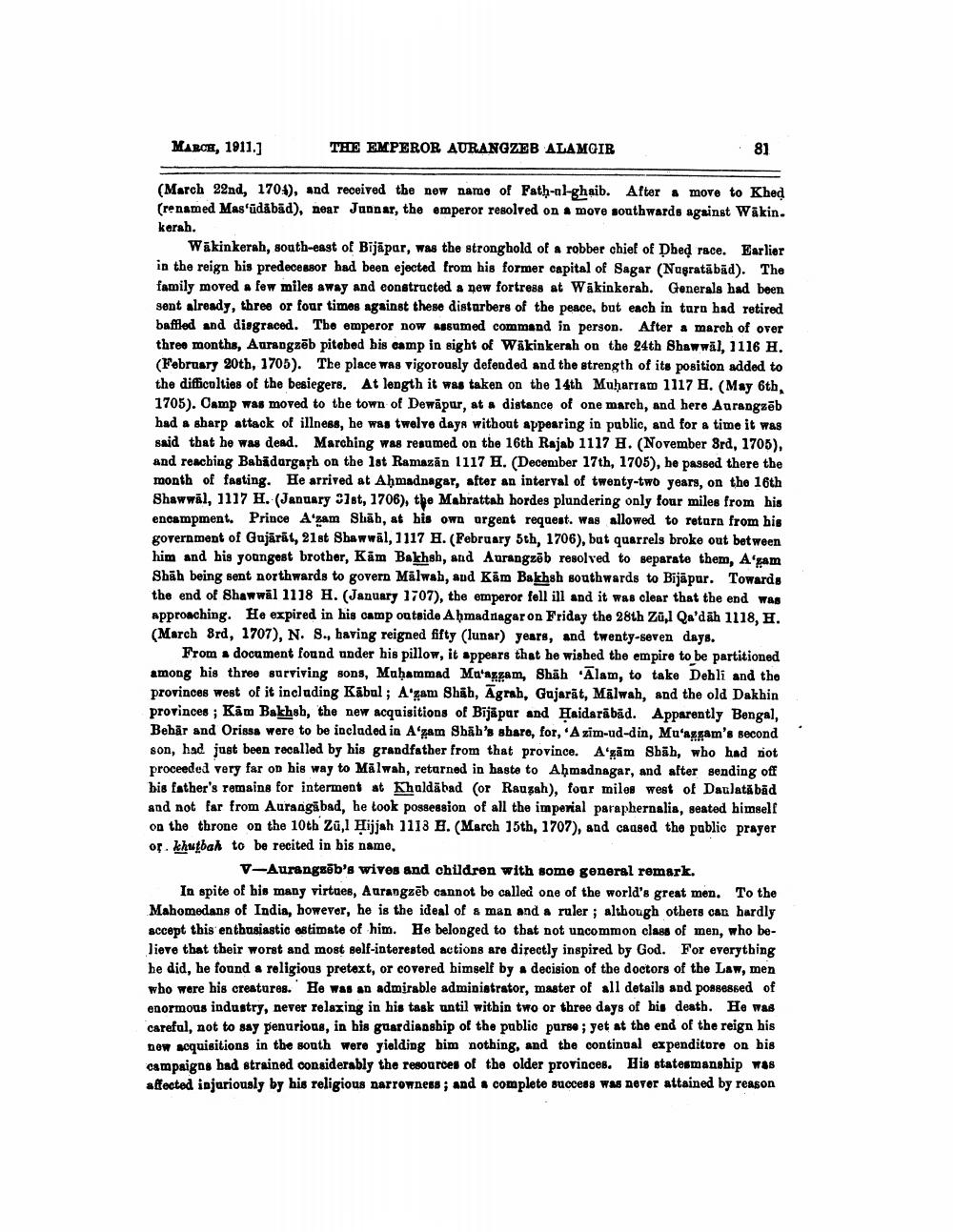________________
MARCE, 1911.1
THE EMPEROR AURANGZEB ALAMGIR
81
(March 22nd, 1706), and received the new name of Path-ul-ghaib. After a move to Khed (renamed Mas'ūdābād), near Junnar, the emperor resolved on a move southwards against Wākin. kerah.
Wäkinkerah, south-east of Bijäpar, was the stronghold of a robber chief of Dhed race. Earlier in the reign his predecessor had been ejected from his former capital of Sagar (Nusratābād). The family moved a few miles away and constructed a new fortress at Wakinkerah. Generals had been sent already, three or four times against these distarbers of the peace, but each in turn had retired baffled and disgraced. The emperor now assumed command in person. After a march of over three months, Aurangzēb pitobed his camp in sight of Wäkinkerah on the 24th Shawwäl, 1116 H. (February 20th, 1705). The place was vigorously defended and the strength of its position added to the difficulties of the besiegers. At length it was taken on the 14th Muharram 1117 H. (May 6th, 1705). Camp was moved to the town of Dewāpur, at a distance of one march, and here Aurangzēb had a sharp attack of illness, he was twelve days without appearing in public, and for a time it was said that he was dead. Marching was resumed on the 16th Rajab 1117 H. (November 3rd, 1705). and reaching Babädargaşk on the lat Ramazan 1117 H. (December 17th, 1705), he passed there the month of fasting. He arrived at Ahmadnagar, after an interval of twenty-two years, on the 16th Shawwal, 1117 H. (January 31st, 1706), the Mabrattah hordes plundering only four miles from his encampment. Prince A'zam Shāh, at his own argent request. Was allowed to return from his government of Gujārāt, 21st Shawwāl, 1117 H. (February 5th, 1706), bat quarrels broke out between him and his youngest brother, Kām Bakhsh, and Aurangzēb resolved to separate them, Agam Sbāh being sent northwards to govern Mälwah, aud Käm Bakhsh southwards to Bijapur. Towards the end of Shawwal 1118 H. (January 1707), the emperor fell ill and it was clear that the end was approaching. He expired in his camp outside Ahmadnagar on Friday the 28th Zül Qa'dāh 1118, H. (March 3rd, 1707), N. S., having reigned fifty (lunar) years, and twenty-seven days.
From a document found under his pillow, it appears that he wished the empire to be partitioned among his three surviving sons, Muhammad Maagzam, Shah Alam, to take Dehli and the provinces west of it including Kābul ; A'zam Shah, Agrah, Gujarāt, Mālwah, and the old Dakhin provinces ; Kam Bakhsh, the new acquisitions of Bījāpar and Haidarābād. Apparently Bengal, Bebär and Orissa were to be included in A'zam Skāb's sharo, for, 'A zim-ud-din, Mu'aggam's second son, had just been recalled by his grandfather from that province. A'zām Shāh, who had not proceeded very far on his way to Mālwah, retarned in haste to Ahmadnagar, and after sending off bis father's remains for interment at Khuldībad (or Raugah), four miles west of Daulatābād and not far from Aurangabad, he took possession of all the imperial paraphernalia, seated himself on the throne on the 10th Zul Hijjah 1113 B. (March 15th, 1707), and caused the pablic prayer op. khutbah to be recited in his name.
V-Aurangzēb's wives and children with some general remark. In spite of his many virtues, Aurangzēb cannot be called one of the world's great men. To the Mahomedans of India, however, he is the ideal of a man and a ruler ; although others can hardly accept this enthusiastic estimate of him. He belonged to that not uncommon class of men, who believe that their worst and most self-interested actions are directly inspired by God. For everything he did, he found a religious pretext, or covered himself by decision of the doctors of the Law, men who were his creatures. He was an admirable administrator, master of all details and possessed of enormous industry, never relaxing in his task until within two or three days of his death. He was careful, not to say penurious, in his guardianship of the public purse ; yet at the end of the reign his new acquisitions in the south were yielding him nothing, and the continual expenditure on his campaigns bad strained considerably the resources of the older provinces. His statesmanship was affected injuriously by his religious narrowness; and a complete success was never attained by reason




